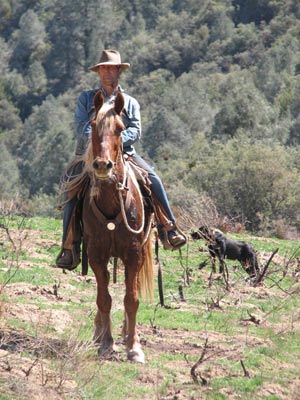Dick Gibford to Read at Santa Barbara’s Blue Agave
Cowboy, Poet, and Mystic Finds His Muse in North County
Out past the hills north of Santa Barbara lie some of the quietest expanses of land in the county. It’s there that cowboy poet Dick Gibford makes his home. He lives alone, except for the company of his horses, his cat, his cows, and the great silence that pervades the valley where he lives and works. On second thought, maybe Gibford’s not so alone after all. It’s out there, far from the city, where he hears the voice of the muse that inspires his poetry.

Gibford wears a blue bandanna around his neck, and a cowboy hat rests on his head. This morning, we sit in his outdoor living room, a menagerie of mismatched pieces of this and that gathered from who knows where, like the metal barrel that serves as our coffee table. A dozen brown-black cows and calves wander up a nearby trail. Beyond them the land rolls to the horizon, quiet and unspoiled.
In 1983, Gibford proposed the idea for a national gathering of cowboy poets. The first National Cowboy Poetry Gathering was held in 1985, in Elko, Nevada, where it’s been held annually ever since. Attendance at the gathering reached almost 10,000 in 1990.
“When I was a kid, my mother used to read me poems before I went to bed,” Gibford explained, “and I had really good teachers who helped me.” Yet he worries the appreciation of poetry isn’t being passed along to the younger generation. “This goes back thousands of years: people passing things on through the spoken word,” he said. “As a civilization, we’re going downhill if we rely totally on machines to communicate. With the creative spoken word, you have the whole gamut of human emotions. It’s something children need to have access to.”

Each morning, Gibford rises and walks a mile or two until he reaches the Painted Gate, a cave where he believes Chumash holy men and women performed sacred ceremonies. “It’s like a church; an old, old church,” he explained. “I don’t sit there, cross-legged, going, ‘Omm,’ or anything. It’s what I call cowboy meditation. I just sit there and get quiet and get connected to nature and the land. My idea of God-the Great Spirit-lives out here.”
“My hope,” he continued, “is that one of my poems might add to someone’s life; maybe awaken a creative urge in people to go out in nature more. My poems all have a little hint that there’s something beyond the ordinary.”
As Gibford speaks, he gazes into space, plays with his chin, and tugs on his bandanna. “Living out here is almost like a preparation for dying,” he mused. “Maybe unconsciously I’m preparing myself in this life for a perfect death. To the mystics, death is like taking off an old coat and stepping out into the Spirit World. I think that’s all any of us could hope for: to have a peaceful death, to go consciously, with full awareness.”
Smiling, he looks me in the eye. “I’m kind of a philosophical son-of-a-bitch, ain’t I?” And he laughs a full and joyful laugh, and gazes out at the hills and valley that are his home.
From Gibford’s “By The Painted Gate”
Where The Ancient Ones left art,
By Caverns in the Rocks
Where ocean tides slapped and shaped
The stone
A million years ago,
Beyond time, beyond all sound
In the silence of the universe
He sits beside his hobbled horse
And meditates
In the silence :
: he talks with ancient ones
And they hear his prayer.
4•1•1
Aside from his own poems, Dick Gibford recites the poetry of others, including such standards as Robert W. Service’s “The Cremation of Sam McGee.” He’ll give a reading on Friday, April 17, at 7:30 p.m. at the Blue Agave (20 E. Cota St.). No charge.



